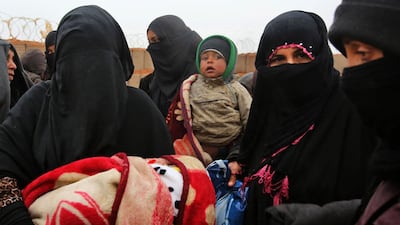The United Nations said on Friday it will help evacuate civilians from an "abysmal" Syrian desert camp near the border with Jordan, after a mission last week determined who wanted to leave.
"We are ready to facilitate" evacuations from the Rukban camp, said Panos Moumtzis, the UN's Syria humanitarian chief.
"We want to make sure it happens in a voluntary way," he said during an interview in Beirut, describing the situation in the settlement as "abysmal".
The UN official said about 12,700 people remain in the isolated Rukban camp near a base used by the US-led coalition fighting ISIS.
The Syrian government and key backer Russia said in February they had opened corridors out of the camp, calling on residents to leave.
More than half of the original population has left in the past months, the United Nations says.
The UN and the Syrian Arab Red Crescent sent a mission to the camp last week to determine how many people remained inside and who wanted to leave, the UN official said.
"A little bit more than a third of them want to leave," Mr Moumtzis said.
"The vast majority want to go into government-held areas and some others want to go to the north," held by the opposition.
About 47 per cent of surveyed camp residents said they wanted to stay, citing reasons including "security concerns" and "fear of detention".
Rights groups have said civilians returning to government-held territory have faced detention and conscription.
Those fleeing to the rebel-held north might face violence in the Idlib region, where Russian and regime bombardment have killed more than 950 people since April.
Although Rukban has not received aid since February, the latest UN mission did not deliver any relief items beyond "a minimal number of health supplies", Mr Moumtzis said.
But last week's visit is only the first part of a "two-step" plan — the second of which will involve aid delivery, the UN official said.
"The next mission — I hope very quickly — will go back and deliver the desperately needed assistance," he said, without providing a specific date.
Conditions inside Rukban are dire, with many surviving on just one simple meal a day, often bread and olive oil or yoghurt, one resident said.
Abu Ahmad Al Dirbas Khalidi, the head of an opposition-run civil council in the camp, said the UN has vowed to deliver food aid by the first week of September.
Evacuation buses will be allowed to enter the camp after this aid is received, Mr Khalidi said.
A second batch of medical aid and other non-food relief items will follow the first round of evacuations, the local council head said.
"The situation is desperate," Mr Moumtzis said, describing Rukban as one of the hardest places to reach in Syria for humanitarian actors.
Neighbouring Jordan has largely sealed its border in the area since 2016, after a deadly attack claimed by ISIS on Jordanian soldiers.
Aid from areas held by the Syria regime to the camp — in a region where US-backed rebels are also present — requires permission from Damascus.
In February, a humanitarian convoy of 133 trucks delivered food, clothes, health care items and medical supplies to the camp's residents.
The February 6 delivery was the second in three months.
Syria's civil war has killed more than 370,000 people and displaced millions since it started with the brutal repression of anti-government protests in 2011.

